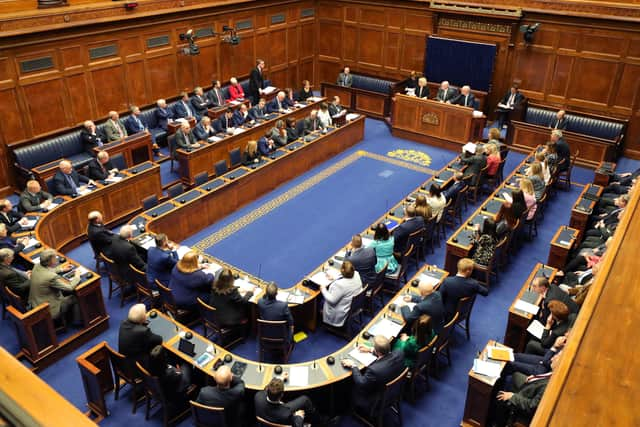Jim Allister in Stormont attempt to jail those guilty of RHI-type behaviour


It has emerged that within moments of Stormont’s restoration on Saturday the North Antrim MLA had lodged a private member’s bill in an attempt to make a host of Stormont reforms to deal with some of the dysfunctionality and bad behaviour exposed by the RHI scandal.
The bill could be quashed by the DUP and Sinn Fein, but to do so would be politically embarrassing, given those parties’ commitments to deal with the systemic problems which contributed to the cash for ash scandal.
Advertisement
Hide AdAdvertisement
Hide AdMr Allister, a former criminal QC and the Executive’s most vocal critic, said that his Functioning of Government (Miscellaneous Provisions) Bill “puts it up to the big parties” to prove that they are genuine about meaningful reform.


Mr Allister’s bill would retain a spad in each Executive department but would end the current situation whereby there are eight spads in The Executive Office – four each for the DUP and Sinn Fein. Mr Allister’s bill would halve that number to two for each party.
Last week’s deal to restore Stormont did nothing to curb either the number of special advisers (spads) or their salaries – which in the last Stormont the DUP and Sinn Fein had increased to £92,000 in some cases.
The two most significant elements of the bill would create new criminal offences for some of the conduct which featured during the RHI scandal.
Advertisement
Hide AdAdvertisement
Hide AdMr Allister’s legislation would make it a criminal offence for any minister, civil servant or spad to electronically communicate government business using personal email or other accounts – something which hides government business by keeping it off the grid.
The widespread use of private email systems, private phones and other electronic communications by many DUP and Sinn Fein ministers and spads added to the cost of the RHI Inquiry, making it time-consuming and in some cases impossible to piece together what had gone on within government when that information should all have been held centrally within the department and accessible to an inquiry or a court if necessary.
It would be a defence for anyone charged with such an offence to show that they had “reasonable excuse” for the failure to use official systems. However, if they were convicted by a court the offence would carry a prison sentence of up to two years.
Mr Allister’s bill would also make it a criminal offence for a minister or special adviser to communicate confidential government information to a third party, something which happened on multiple occasions during the RHI scandal, including when Arlene Foster’s then spad, Andrew Crawford, sent to family members confidential ministerial papers setting out how cash for ash was soon going to be brought to an end.
Advertisement
Hide AdAdvertisement
Hide AdWith the threat of a five-year prison term, the bill would make it a criminal conviction for any minister, spad or civil servant “to communicate, directly or indirectly, confidential and/or commercially sensitive information to any natural person or legal entity for the financial or other potential benefit of any natural person, legal entity, minister, special adviser or civil servant”.
However, even if the bill was passed into law, it would not apply retrospectively to any of those involved in the RHI scandal.
The bill would also attempt to:
• Prevent Sinn Féin’s use of unofficial spads, facilitated by the civil service, to get around past legislation which barred those with serious criminal convictions from acting as government advisers;
• Make spads subject to the processes and procedures of the civil service disciplinary code;
Advertisement
Hide AdAdvertisement
Hide Ad• Slash the upper level of spad pay to bring it into line with that of a senior civil servant at assistant secretary (grade five) level;
• Allow the Assembly’s Commissioner for Standards to investigate complaints against ministers;
• Place a duty on the civil service to “make and keep an accurate written record of every meeting attended by a minister in departmental service, recording, in particular, those present, date and time, topics discussed, each ministerial indication of intent and every decision and action point”.
The bill will first have to clear the Assembly authorities before making it to the floor of the Assembly chamber and would only pass into law if it the DUP and Sinn Fein – who between them have a majority of MLAs – either voted for it or decided to allow it to pass.